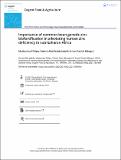| dc.description.abstract | Zinc deficiency is among the leading risks to human health in sub-Saharan
Africa, its adverse exposure leads to diarrhea, pneumonia, and malaria. Furthermore,
it is the leading cause of stunting in children and negatively influences the human
immune system, body iron, and vitamin A and D. High zinc deficiency in sub-Saharan
Africa is due to the consumption of staple foods with low zinc contents. Genetic zinc
biofortification of common bean among staple food crops is the best approach for
alleviating zinc deficiency, as it is cost-effective and can easily reach low-income
households. Genetic zinc biofortification by conventional breeding coupled with marker-assisted selection is the best strategy for sub-Saharan Africa, as the selection of
crosses is precise and takes short time to develop high zinc-containing varieties.
Zinc content increase in common bean seeds has a high impact on alleviating zinc
deficiency as it is consumed whole compared to cereal grains which undergo
milling, the process that removes zinc-rich parts before being consumed. This review
explains the current status of zinc deficiency in sub-Saharan Africa, conventional
methods for alleviating the problem, current and potential of modern genetic
approaches for zinc biofortification of common bean in alleviating zinc deficiency in
the region. | en_US |

